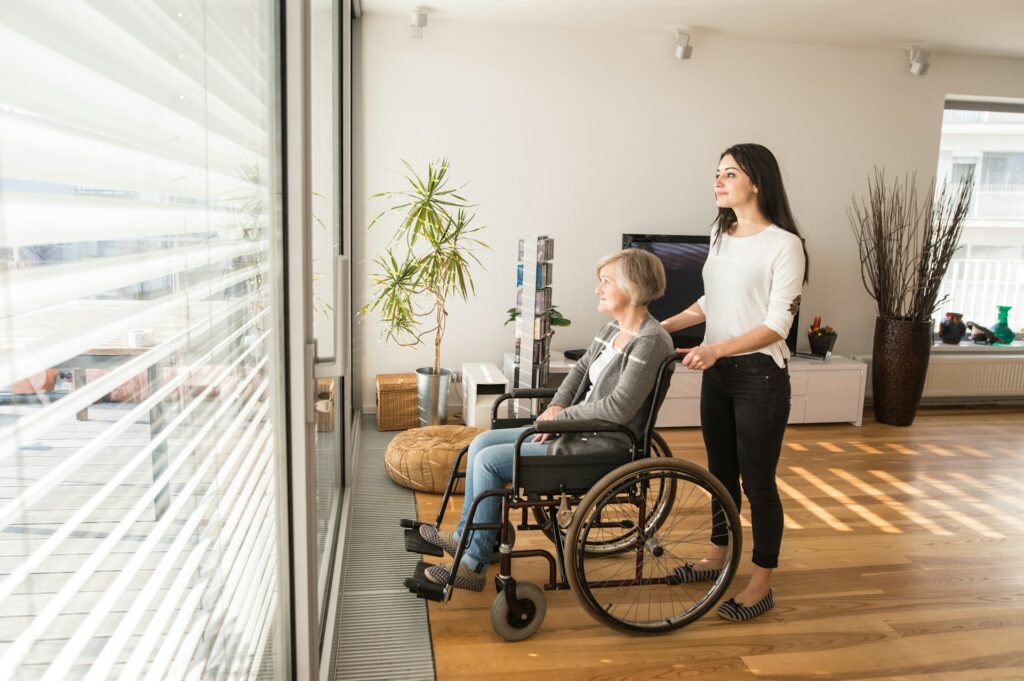Respite care is a service designed to accommodate caregivers on a temporary basis, allowing them to take a break from supporting an individual who requires dependable care they can trust. It’s incredibly useful for many family carers and individuals requiring care. Not only does it help support carers’ well-being and health, but it can also promote independence and confidence for the client.
At Independent People, we are dedicated to delivering personalised, compassionate care to those who need it most. Keep reading to learn more about our respite care services and how we can assist you.
What is respite care?
Respite care is a care service that provides temporary, short-term relief to carers by subsidising their duties and responsibilities with professional care. It gives the carer the opportunity to take a much-needed break, whether that be used to go on holiday, run errands or attend to personal matters, or simply participate in self-care activities.
There are several options for respite care, including home care, day care services, or short stays in a residential home:
- Home care: A professional carer provides support in the individual’s home, allowing them to remain in a comfortable, familiar environment with their usual routines.
- Friend and family support: Another loved one can take over caring duties for a short period while the primary carer steps away.
- Day care services: The individual who requires care can spend a few hours at a local daycare centre, where they can participate in exciting activities and meet new people.
- Supported holidays: Certain charities organise special trips that provide care services for individuals while they’re away from home.
- Residential care: Individuals can move into residential homes on a temporary basis, ranging from a few days to weeks, for round-the-clock support while their primary carer is unavailable.
The importance of respite care
When a person’s care needs increase as a result of age, injury or illness, a loved one will usually step into the role of main carer. This can be rewarding yet challenging, especially if the carer has other commitments and responsibilities to balance. Caring for a loved one isn’t only physically demanding, but emotionally taxing, too.
If you’re the primary caregiver for a loved one, it’s essential that you take some time for yourself to rest, recharge, and recuperate. Without this, you won’t be able to provide compassionate care to the best of your ability and feelings of frustration, irritation and resentment may increase.
Many family caregivers don’t realise the importance of scheduling routine breaks and often feel guilty about taking them. You may feel like your loved one’s care is your sole responsibility, but you cannot provide effective support if you’re not taking care of yourself.
By taking a break, whether that be a couple of days or a few weeks, you’ll reduce the pressure on your emotional and physical health and well-being. Many family carers report feeling happier, fresher and revitalised after a break, especially when they know their loved ones are well cared for in their absence.
Benefits of respite care on family carers
Respite care often plays a vital role in supporting family carers by ensuring they have sufficient cover when they need a well-deserved reprieve. There are several ways this benefits family carers, such as:
- Avoids stress and burnout: Regular breaks, facilitated by respite care, enable carers to avoid exhaustion, which can have a negative impact on their mental and physical health.
- Stronger familial relationships: After a break and the ability to focus on themselves, many caregivers find that they’re in a better mindset to care for their loved one, which improves and strengthens their relationship.
- Improved mental and physical well-being: Time away from caring duties can enhance a carer’s overall health by providing them with free time to focus on themselves, as well as alleviating feelings of loneliness or isolation.
- Offers the opportunity to tend to personal needs: Respite care gives primary carers more time to pursue hobbies, socialise and attend to other personal responsibilities without feeling guilty.
Benefits of respite care on individuals needing care
Respite care isn’t only beneficial for carers, but also for the individual who needs care. While many family carers feel guilt about leaving their loved one with a respite carer, it can be an excellent opportunity for them to experience new things. Benefits of respite care for clients include:
- Offers a change of scenery: Respite carers can take clients to new social activities or places, allowing them to experience the world in a new way that they haven’t been able to recently.
- Opportunity to try new activities: An altered schedule can be mentally stimulating for many, boosting mood, giving them a new lease on life and encouraging mental and physical well-being.
- Improved independence and confidence: Respite carers often encourage independence more effectively than family carers, promoting a higher sense of self-worth and confidence in the client.
- Companionship and emotional support: Respite care provides an opportunity for individuals to interact with new people, rather than just their primary carer.
What is carer burnout?
Carer burnout refers to a state of physical, mental or emotional exhaustion. It’s often a result of stress building up over long periods that tends to go unnoticed until exhaustion sets in and symptoms appear. It’s not uncommon for carers to accidentally neglect their own physical and mental health when looking after their loved one, increasing the risk of burnout.
Symptoms and warning signs of carer burnout could include:
- Physical or emotional exhaustion
- Changes in sleep patterns
- Social disengagement
- Frequent illness
- Fluctuations in weight and appetite
- Difficulties concentrating
- Low mood, anxiety and guilt
Carer burnout can lead to extreme feelings of overwhelm, chronic stress, exhaustion and even emotional and physical symptoms. It can harm your quality of life, which in turn affects the care your loved one receives. Burnout can be avoided by asking for and accepting help, prioritising self-care, and considering professional respite care.
Why is respite care better at home for older adults?
There are several benefits to all types of respite care, and some work more effectively for certain families than others. For example, daycare centres are excellent for carers who need a reliable break one day a week to run errands and attend to personal needs.
However, many clients and carers will agree that home care is the best option for the majority of respite periods. The World Health Organization recommends that older adults be cared for in their own homes for as long as possible to maintain a strong sense of well-being.
Most respite carers can provide comprehensive, bespoke care in the comfort of home. This is where they can continue routines as seamlessly as possible, avoid confusion and negative responses from clients, and maintain independence without increasing the risk of falls.
Call us to discuss respite care
Independent People Homecare offers a wide choice of live-in carers on both a long-term and short-term basis, giving you care that is flexible and tailored to your needs. To find out more, call us today on 0800 471 4741 for a friendly chat about how it works or to arrange live-in care.

